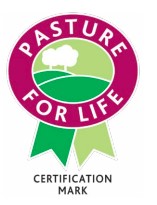Ten years ago The Pasture-Fed Livestock Association (PFLA) was formed by four farmers in the back room of a pub. Now, with more than 600 members and almost 2,000 consumer supporters, the organisation is looking ahead with confidence and excitement. Sara Gregson reports…
The PFLA is a diverse and growing community of farmers, butchers, food retailers, academics and consumers, who all champion the regenerative use of grazing animals to produce 100% pasture-fed meat and dairy. More than 100 members are certified ‘Pasture for Life’, which means they can use the Pasture for Life rosette in the promotion of their food products. Consumers can be sure the animals their meat and dairy came from only ever ate grass and pasture, no grains.
This year has seen the publication of a new mission and strategy in which the PFLA seeks to encourage more agroecological farming methods, promoting higher environmental outcomes and animal welfare and the production of nutritionally dense food.
The PFLA aims to achieve its mission through three strategic pillars:
• Culture – spreading awareness of the benefits of 100% pasturefed farming systems, through education, marketing and events, which will bring more people into the network
• Certification – providing a set of standards that act as a benchmark and developing market mechanisms so that certified products achieve premium prices and certified supply chains are suitable assured
• Collaboration – working with the UK farming community to ensure that pasture-fed principles are at the forefront of agricultural thinking and the PFLA benefits from strong networks with funders and other like-minded organisations.
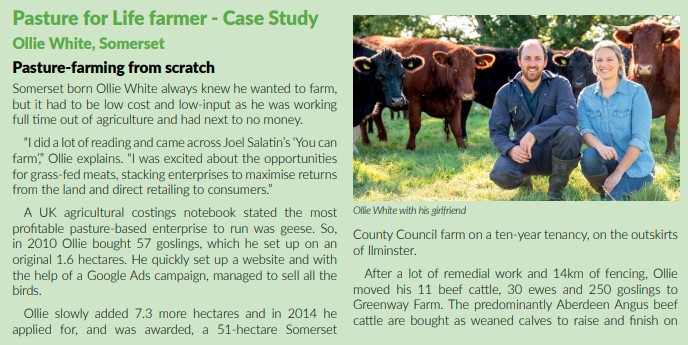
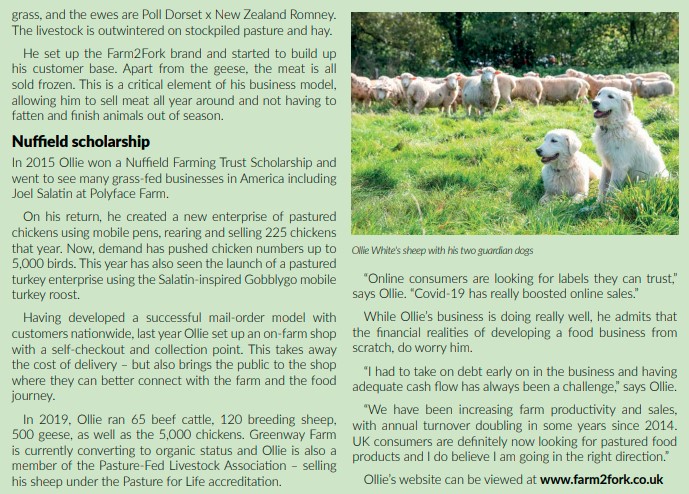
Regional groups
Building on a number of existing groups, the PFLA is now seeking to support its membership at a more local level. The Esmée Fairbairn Foundation has granted the association significant £250,000 seed-funding to help do this over the next three years. “As the PFLA has grown the collegiate culture of the organisation which developed naturally from the start, will be served better by a regional structure,” says the PFLA’s Jimmy Woodrow.
“We shall nurture existing groups like those in the South East and Cotswolds and seek to establish additional groups around the country including in the lowlands of Scotland, South Wales, Cumbria, Herefordshire, Wessex, Devon and Cornwall.
“Working locally will deliver many benefits, including being able to deliver more farmer-to farmer education, which acknowledges the variations in local traditions, soils, terrain, breeds and climate.
“Certified producers will be encouraged to work together to develop local supply chains, identify regional processing hubs and work with butchers and retailers to promote Pasture for Life branded food.
“The groups will also be encouraged to develop relationships with like-minded partner organisations spanning the farming, food and conservation sectors in their areas, such as the Wildlife Trusts and the RSPB.”
For more information visit www.pastureforlife.org
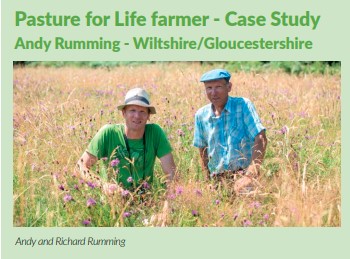
Grazing cattle bring multiple benefits
The Rumming brothers work with their father and uncle on their integrated beef business, which has seen financial returns per animal more than double after just four years. The farm business supports six partners and three generations at two farms, eight miles apart covering 153ha. The River Thames runs through the farm and the soils are predominantly heavy clay overlaying gravels. While not certified organic, no artificial fertiliser has been applied for 15 years. The grassland ranges from highly species-rich hay meadows to ‘improved’ pasture. “I used to be disappointed that our 100% grass-fed cattle were selling as heavy stores for as low as £700 at the livestock market at 30 months of age,” says Andy. “This seemed such a waste.” Andy and his brother Chris, already had experience of producing, processing and direct marketing free-range turkeys at Christmas. For this they had built a basic butchery and installed fridges in the old milking parlour, but these were only used for two weeks in December.
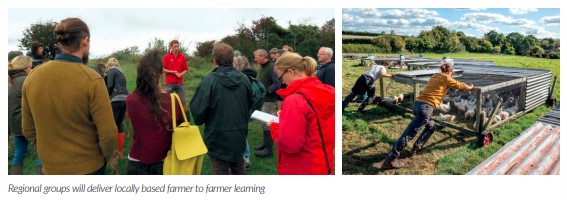
“In June last year we started to age, cut and pack beef animals in-house. We are lucky to live near to an affluent customer base and 80% come to the farm to collect freshly packed meat. Using a Mailchimp email is our key route for generating sales with most beef pre-ordered.”
Four years ago, Andy joined the Pasture-Fed Livestock Association (he says this is the best thing he ever did) and benefited from attending study group tours and taking part in the on-line forum.
Cattle and data
Eighty-five cross-bred cows are put to a pure-bred Stabiliser bull or a pedigree Hereford bull. The cows calve in two groups in spring and summer and are super fertile with 100% regularly scanned in-calf. The aim is for 96% of calves to be weaned per cows and heifers put to the bull and this is often achieved. Calving is at two years of age.
“I like data and my favourite metric is looking at percentage of bodyweight weaned standardised to weaning at 200 days,” says Andy. “The target is 50%. Neither herd has achieved this as a group, although individual cows have. No creep feed is fed and the animals are sold as 100% grass-fed under the Pasture for Life logo.”
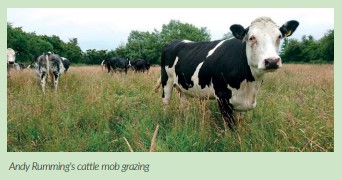
The spring and summer calvers are cell grazed, moving completely every day with mobile water and Kiwitech semipermanent lanes and temporary dividing fences. The heavy soils mean animals are housed from November or December to the beginning of April and fed just on silage and hay. Straight after weaning, all youngstock is moved to Andy’s brother’s farm where Chris runs a rotational grazing system with 80 to 100 cattle at any one time. Finished cattle are now slaughtered at 18 months to two years at a carcase size of approximately 305kg for heifers and 335kg for steers.
“Direct retailing is not easy and we have to employ a butcher to break the carcasses down,” says Andy. “But the returns are much better than the £700-£1100 for stores we get. We are adding value with retail income of up to £2,500 or more per animal.”
Visit Andy’s website at www.andyrummingbeef.co.uk
